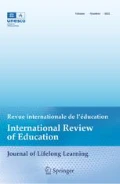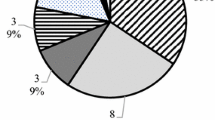Abstract
The author presents three approaches to contemporary human rights education practice: the Values and Awareness Model, the Accountability Model and the Transformational Model. Each model is associated with particular target groups, contents and strategies. The author suggests that these models can lend themselves to theory development and research in what might be considered an emerging educational field. Human rights education can be further strengthened through the appropriate use oflearning theory, as well as through the setting of standards for trainer preparation and program content, and through evaluating the impact of programs in terms of reaching learner goals (knowledge, values and skills) and contributing to social change.
Similar content being viewed by others
References
Bernbaum, Marcia. 1997. Evaluating Human Rights Programs. In: The Human Rights Education Handbook (135-154).
Flowers, Nancy, Bernbaum, Marcia, Rudelius-Palmer, Kristi and Tolman, Joel. 2000. The Human Rights Education Handbook. Minneapolis: Human Rights Resource Center, University of Minnesota.
Freire, Paolo. 1990. Pedagogy of the Oppressed. New York: Continuum.
United Nations General Assembly Resolution A/52/469/Add.1, 20 October 1997.
Koenig, Shulamith. 2000. Message to On-Line Forum “Mid-Term Review of UNDecade for Human Rights Education” July 21, 2000, hosted by Human Rights Education Associates (HREA).
Meintjes, Garth. 1997. Human Rights Education as Empowerment: Reflections on Pedagogy. In: George J. Andreopoulos and Richard Pierre Claude, eds., Human Rights Education for the Twenty-first Century. Philadelphia: University of Pennsylvania Press.
Neylon, Lyn B. and Tibbitts, Felisa. 1999. Strategizing for a Human Rights Movement in the US. In: Evaluation of Human Rights USA: Final Summative Report, prepared for the Ford Foundation, New York.
Stromquist, Nelly B. 1999. Gender Delusions and Exclusions in the Democratization of Schooling in Latin America. Comparative Education Review 40(4).
Tibbitts, Felisa and Torney-Purta, Judith. 1999.Citizenship Education in Latin America: Preparing for the Future. Washington, DC: Inter-American Development Bank.
Tibbitts, Felisa. 1997. Evaluation in the Human Rights Education Field: Getting Started. The Hague: Netherlands Helsinki Committee/HREA. Available on-line at www.hrea.org.
Tibbitts, Felisa. 1994. Human Rights Education in Schools in the Post-Communist Context. European Journal of Education 29(4): 363-376.
Zald, M. N. and McCarthy, J. D., eds. 1979. The Dynamics of Social Movements. Cambridge: Winthrop Publishers, Inc.
Author information
Authors and Affiliations
Rights and permissions
About this article
Cite this article
Tibbitts, F. Understanding What We Do: Emerging Models for Human Rights Education. International Review of Education 48, 159–171 (2002). https://doi.org/10.1023/A:1020338300881
Issue Date:
DOI: https://doi.org/10.1023/A:1020338300881




